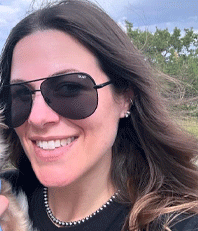
Devin Garofalo
Assistant Professor, Department of Literature

- Q&A
- Biography
Q&A
What excites you most about joining our School of Arts and Humanities community?
“So many things! First and foremost, the absolutely incredible community. When I gave my job talk in the Department of Literature, I was blown away by the conversation that followed. I walked away with lots of exciting ideas for my project and a certainty that being at UC San Diego would shape my research itinerary in unanticipated ways.”
“In addition to joining the Department of Literature's truly innovative faculty, I am particularly excited about the School of Arts and Humanities' emphasis on collaboration across bounds (disciplinary, institutional and cultural). I'm also looking forward to Institute of Arts and Humanities programming, and to working with the school’s fantastic students (a few of whom I was lucky enough to meet earlier this spring).”
Why did you choose your field? Why should students consider studying the arts and humanities?
“The path I took to choosing my field was wayward. It began with a course in Women's Studies in Literature, which was taught by a scholar who was a very recent hire at my university—and who was the first professor who saw I had ideas and made me realize I had them, too. That professor also happened to be a Romanticist, which is part of how I began to develop an interest in the 19th century.”
“On why students should study the arts and humanities: The arts and humanities are a public good. They are windows into the most pressing issues of our current moment and the histories of how those issues came to be. They afford new (sometimes because old and, thus, forgotten) ways of speaking, imagining, and building.”
“Everyone has a right to an imaginative, aesthetic, cultural life—everyone, and without apology. All forms of communication depend upon aesthetic representation. For example, Charles Darwin couldn't escape—and, indeed, needed—figures of speech like anthropomorphosis and personification to make expressible complex material processes like natural selection. We need good thinkers of words, genres and forms. We need folks who know how to use, experiment with, and invent new words, genres and forms! Which words, genres and forms are necessary for thinking and living amidst something like climate collapse? To answer that kind of question we need arts and humanities majors in addition to STEM majors.”
“I feel somewhat obligated to add that contrary to popular belief, humanities majors get jobs. According to a 2023 report from the American Academy of Arts and Sciences, humanities majors are on average no more likely to be jobless than other college graduates. Further, their median salaries are about the same or higher than those in the behavioral and social sciences and education.”
What research or project are you working on currently?
“Currently, I am finishing a book that traces the historical co-emergence of the seemingly universal but ultimately white speaking subject of lyric poetry and colonial Man as a self-consciously planetary agent who terraforms Earth on a geologic scale.”
“The book shows how 19th century poets and critics conceptualized poetry as a monohumanist discourse to be weaponized in service of British colonial planetarity. It does so to expose how the 19th century lyric ‘I’ underwrites an interrelated set of violent world-building projects (enslavement, dispossession, genocide) whose aftershocks shape our ecocidal present.”
“Additionally, I'm co-editing a collection of essays on Barbara Johnson and feminist deconstruction in the wake of a series of ongoing, rolling, formative catastrophes (including the Dobbs decision, climate collapse and recent attacks on higher education).”
What’s your favorite class to teach and why?
“My favorite class to teach is often a class I have yet to teach, by which I mean I am constantly reimagining what and how I teach in conversation with my students. Thanks to these conversations, I've taught courses like ‘Ecofeminist Literature and Theory’ (one of my all-time favorites that I'm looking forward to teaching in a revised form during the Winter Quarter).”
“In general, I try to teach courses that situate the historical periods in which I specialize in conversation with the present, so that students can see how these seemingly ‘old’ literatures open up the here and now (and vice versa). All the courses I teach likewise tend to draw together questions of personhood, institutional power, ecology and justice.”
What is something about yourself that is not typically included in your bio?
“I played jazz flute before Ron Burgundy made it a punchline.”
Biography
Devin Garofalo earned a Ph.D. in literary studies from the University of Wisconsin-Madison. She is journal editor of Victorian Poetry. Prior to joining UC San Diego, she served as an assistant professor of English at the University of North Texas.
Three interests galvanize her research and teaching: (1) the entanglements of nineteenth-century literatures, colonial ecologies, and race; (2) how literary forms and rhetorical figures (like anthropomorphosis) sponsor material processes of dehumanization from the eighteenth century into our own; and (3) the ways certain reading methods shore up restrictive personhoods.
Garofalo is a recipient of the Interdisciplinary Nineteenth-Century Studies Association’s annual Richard Stein Essay Prize and was a recent finalist in the North American Society for the Study of Romanticism’s annual pedagogy contest. All of Garofalo’s work explores the import of humanistic inquiry—and literary studies, in particular—now.
